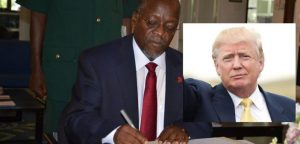Be warned. Tanzania’s Trump shows how quickly democracy can be undone

Tanzania’s President John Magufuli and a super-imposed image of US President Donald Trump
Coincidentally, I was reading about Tanzania’s President John Magufuli almost at exactly the same time that a US paper was editorializing the following about President Donald Trump’s behaviour towards former acting FBI director Andrew McCabe: “Mr Trump acts like a nasty, small-minded despot, not the leader of a democracy more than two centuries old in which rule of law is a sturdy pillar.”
The paper’s reference is to the firing on Thursday, March 16, of Mr McCabe just 26 hours before he could retire on a full pension. The pettiness, vengefulness and apparent unfairness of such an action stands out to me as someone who has had family in government and public service for more than a century (my grandparents, parents and uncles in India; my sister in the UK; my husband in the US.)
Now, let’s consider the current similarities between Tanzania and Trump’s America.
The Economist writes of Tanzania’s “sickening lurch to despotism” as follows: “Opposition politicians are being shot; activists and journalists are disappearing… Officials have taken to making arbitrary demands for taxes. Businesses are shutting, exports are slumping, investors are fleeing and economic growth is forecast to slow.” Political rallies are also banned, as is critical public commentary.
Why is this happening in Tanzania now, a country that had been growing strongly at 6.5 per cent for the past decade and where democracy was making progress from 1994 until Mr Magufuli’s 2015 election?
It’s because of just one man. As The Economist points out, “A bit like President Donald Trump, Tanzania’s president, John Magufuli, likes to fire employees on television.” Also much like Mr Trump, Mr Magufuli bashes foreign businesses in his country and he denounces critics as “immoral”. Apparently, he’s slapped impossible demands for tax payments on foreign-owned businesses such as Acacia, a London-listed gold-mining company. (Acacia supposedly owes Dar es Salaam $190bn or roughly four times Tanzania’s GDP.)
Mr Magufuli has also shut down newspapers and locked up “immoral” musicians who don’t (to use Mr Trump’s words from half a world away) say nice things about the Tanzanian president. He can do all this by taking advantage of Tanzania’s constitution, which has never been changed from the autocratic cast given it to in 1977 by the country’s founding father Julius Nyerere.
Nyerere considered democracy to be a luxury, a distraction for a poor country in which much work needed to be done. That was then.
Today’s Tanzanian story is a salutary lesson, not just for Africa but for the US.
Some will scoff at that last statement. Obviously, there is little comparison between America and Tanzania. The US has democratic strengths that go back a couple of centuries, as well as a vibrant civil society and a fierce belief in individual liberty and freedom of speech. Tanzania, a country that depends on western aid, is a flawed, fledgling and now-endangered democracy.
But it’s true too that democracies can be undone precisely because of their strengths.
Openness and freedom of expression can be used against democracy, against free and fair elections, and against rule of law just as much as for it. It can be used by autocratic leaders to whip up sentiment against commentary and criticism. Mr Magufuli calls it “immoral”. Mr Trump terms it “fake news”.
We are all warned.

